
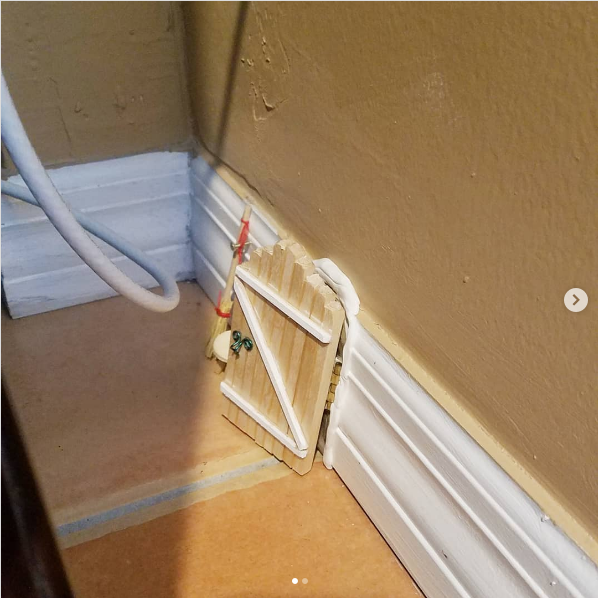
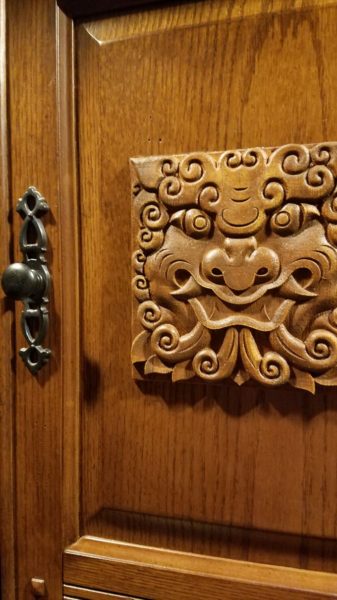




We upgraded some lighting in our library/dining room/office, so I thought I’d share a collection of scenes including the new lights.
Ramblings and webcomics from LeEMS








We upgraded some lighting in our library/dining room/office, so I thought I’d share a collection of scenes including the new lights.
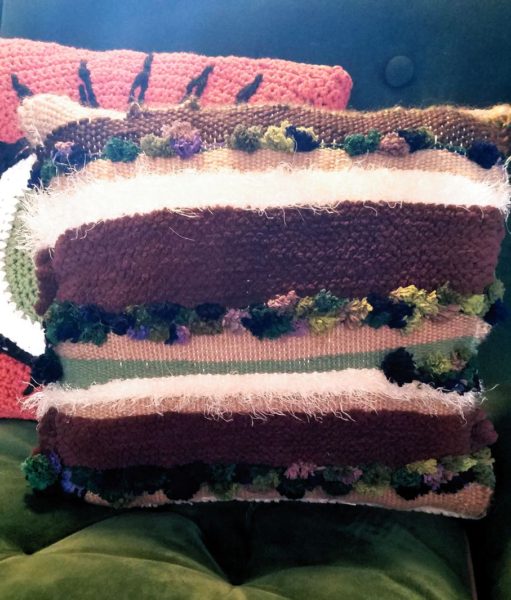
If you happen to have a similar internet bubble to me, then you’ll have seen loom DIY and loom weaving rise in popularity. I have recently caved to the phenomena and acquired a loom for myself. I thought it would be a wonderful and more expedient way to use up the yarn collection that lives in a corner of my guest room. It’s not that I don’t like knitting or crochet. I find the process of creating fabric from string really fascinating no matter what method. However, I sometimes lack patience and knit and crochet pieces seem to take so long.
I found weaving to be much faster, and less stretchy – for those projects that might require a little more stiffness. I used up a bunch of yarn remnants in my first experiment: a pillow cover. I had to reinforce the sides with some backing fabric, which is also where I attached the zipper. I am very pleased with it and look forward to learning some weaving stitches and techniques.
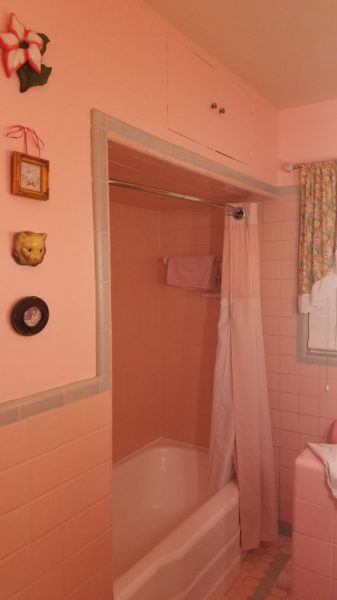
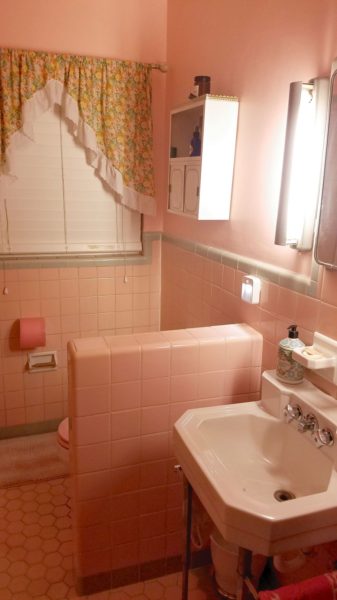
A few years ago I did a before and after post about the original pink bathroom in our house. Back then, maybe a year after we had been living in the house, I decided that the best way to update the dingy flat white walls was to aim for somewhere between the pink tile and the fading blue accent tile. We ended up painting it a sort of dusky violet, that, upon years of reflection, was the wrong choice. So we have embraced the pink and repainted! The new color does wonders at brightening a room that is lit only by the window and original medicine cabinet side fixtures.
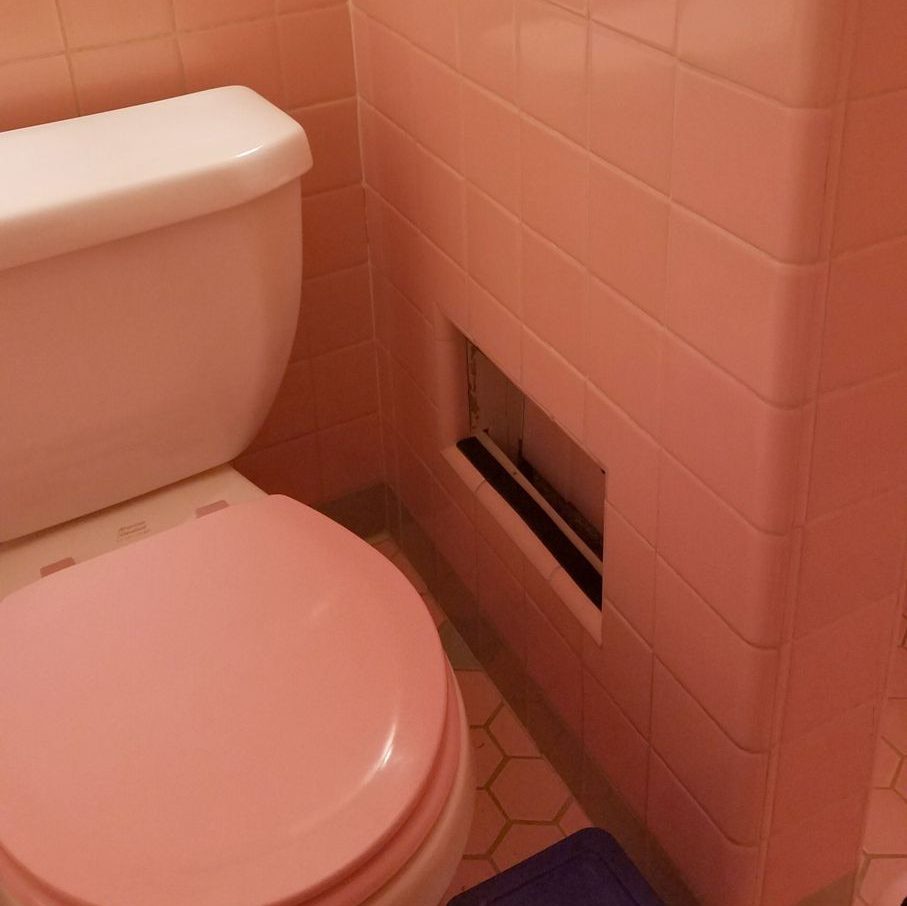
What I failed to post about years ago is the mystery hole. In the half wall that separates the toilet from the sink is a built-in cavity. It is partially finished, that is, the tile wraps around the edge and is also at the back of the hole. The sides of the cavity are not tiled, nor is the bottom.
*that black strip you see in the photo is foam tape that helps hold the blue lidded plastic shoe box in place to keep the cats out of the hole.
I have scoured the internet and vintage magazines for a hint at its original purpose. Mid century bathrooms often had built in shelves for utility or display, but the bottom of this cavity is unfinished and just held a bunch of garbage. Also, it is right at toilet seat height, so it wouldn’t be useful for many things. I wondered if maybe it had an insert at one time that would turn it into a receptacle of some kind. I also ruled out toilet paper, since the tile toilet paper holder on the other side of the toilet (in the above pictures) is original to the bathroom. So, if you have an idea, let me know!
In 1840s Louisiana, public attention was captured by the story of a German immigrant who had lived enslaved for over twenty years. The articles communicate an alarm that a white person could be forced into the very same situation that many people of color were experiencing every day. The story of Sally Miller was much more than mistaken identity, it explored how race was defined and performed, and how immigrant communities were encapsulated into a culture that made one race preeminent over all others.
Based on information that came out during the court case and investigations thereafter, we now know more about Sally Miller than she did herself at the time. She was born Salomé Müller in Langensaultzback in Alsace on the Lower Rhine in 1814 to parents Daniel and Dorothea (“Sally Miller,” 1845; “Sally Miller,”2021). Her parents were part of a group of about 1800 German immigrants from Alsace, mostly farmers and mechanics, who had contracted with a ships-master for passage to the United States. The ship-master stole away with their money and left them stranded in Amsterdam. Unable to continue their journey without paying the ship owners for passage, they were stranded, until a contract for their transport was made on their behalf by the ‘Holland Government,’ so says the article in the Hartford Courant in 1846 (“The Case of Salome Muller,” 1846).

Starting in 1816 tens of thousands of Europeans, mostly German and Swiss, were leaving their countries to escape burdensome taxes, crop failures, conscription, and unemployment in the post-Napoleonic years. Upon arriving in the seaports of Rotterdam and Amsterdam many immigrants would become victims to “soul merchants” and be forced to become redemtioners, contracted to work for for free one to three years in farms and towns of the South to pay back their debt (Hasian, 2003; Sweirenga & Lammers, 1994). Many of the 1800 Germans from the Alsace, sailing on the Johanna for New Orleans, found themselves in the same position.
In March 1818, after many deaths aboard ship during their voyage, the indenture contracts of the surviving Müllers, father, son, and two daughters, were sold to John Fitz Miller of Attakapas Parish, owner of a sugar cane plantation. The Müller’s friends and fellow travelers did not immediately know that within weeks of their installation at the Fitz Miller plantation, Daniel and his son Jacob died of fever. By the time family members tried to reconnect with the two girls, they had vanished (“Sally Miller,”2021).
Sally Miller’s story was unraveled backwards for the courts after this, but I’ll try to keep it organized. Fitz Miller, referred to as Miller in the articles, would later say in court that Sally Miller was purchased from Anthony Williams of Mobile as Bridget, a ‘mulatress.’ Miller changed her name to Mary, because he already ‘had another slave named Bridget.’ During her time at Fitz Miller’s plantation Sally Miller would be given to the Miller’s ‘colored overseer’ for a wife and would give birth to four children, Lafayette (who died about 1839), Madison, Charles and Adeline (“Sally Miller,”2021). After a time Fitz Miller sold her to Lewis (or Louis) Belmonti, who owned a cabaret in a predominantly Spanish section of New Orleans. Belmonti would recount later that he had suspected Sally Miller was white and attempted to rescind the sale, upon which time Fitz Miller said that ‘she was white, and had as much right to her freedom as any one, and was only to be retained in slavery by care and kind treatment (“The Case of Salome Muller,” 1846).
It was working at this cabaret that she caught the eye of Madame Karl (or Carl) Rouff, one of the Müller ‘s fellow travelers on the Johanna. Sally Miller was about thirty. Madame Karl immediately recognized Sally Miller as the child of her friends; she approached and questioned her about her past and parentage. Sally Miller was called Mary at the time, and answered that she did not know or remember her family, and that she had always been enslaved. Not long after this meeting, Madam Karl took ‘Mary’ Miller to Salomé Müller’s cousin and godmother, Eva Schuber and her husband Francis. The Schubers also identified ‘Mary’ Miller as Salomé, the lost daughter of Daniel and Dorothea Müller (“Sally Miller,”2021; “Sally Miller,” 1845; “The Case of Salome Muller,” 1846). Friends and family of the Müller’s, local merchants, came together to file suit against Belmonti for the restoration of Salomé Müller’s freedom.
Many aspects of the trial focused on what Marouf Hasian Jr. called a performance of race. In a society where identification of race was paramount to maintaining legal division, it was important for the men who enslaved Miller to demonstrate how good and virtuous they were, and also how Miller’s own choices and behavior aligned more with non-white individuals. Miller had been classified by society as a ‘mulatress’ or someone of mixed race. She was described as having dark hair, hazel eyes, and being tanned from outside labor (“Sally Miller,” 1845). People of mixed race were difficult for the institutions of the antebellum South because they represented a taboo interaction of two races, and were difficult to categorize in a system based firmly in visual appearance. Still those actors who were responsible and interested in maintaining the categorization of races clung to characteristics, behavior, language, education, and culture as a way to discerning race classification (Hasian, 2003).
The “German mind is strongly excitable and imaginative with a fondness for the wonderful, marvelous, incredible and disposition and eager desire to believe the mysterious….”
–Hartford Courant (“The Case of Salome Muller,” 1846)
Sally Miller’s case also highlighted the difficulties of redemtioners entering into the antebellum South. In the classification systems of the South at the time, these immigrants were not considered ‘blacks’ or free whites. “They were the perfect example of what scholars today call “not-quite” white, the homeless and impoverished sojourners who lived just a few rungs above the black slaves” (Hasian, 2003). At various points in the newspaper coverage of the trial, the German family and friends of Sally Miller were characterized as silly and prone to flights of fancy as a way to undermine their contributions to her case.
Sally Miller and her German supporters did not win her initial court suit. Instead her supporters were instructed by the judge to buy her freedom; essentially to buy into the institutions and laws constructed to normalize the enslavement of non-whites (Hasian, 2003). And though Sally Miller was refused a retrial, she did bring her case to the Louisiana Supreme Court where she was ‘restored to liberty’ (“Sally Miller,” 1845). Once, free Sally Miller continued working with the court system in an attempt to secure freedom for her three remaining children, but she was not successful (“Sally Miller,”2021). Her story inspired authors of popular fiction post civil war, and was revisited again in the 21st century by John Bailey, who suggests that Miller was never Salomé Müller, but instead used opportunity and ingenuity to trick the courts into ending her enslavement (“Sally Miller,” 2021).
The most resounding part of Sally Miller’s story, to me, was the myriad of laws built around making slavery an acceptable condition in society, from defining those who may be enslaved to tracing ownership of supposed ‘property.’ The more I have studied copyright law, the more I’ve seen that law is firmly rooted in philosophy where structures of thought are built upon each other like blocks of a building. Removing one law will have ramification for the entire structure, but may not actually pull the whole building down. There are precedents and seemingly unrelated laws written with the same philosophical underpinnings still holding out, still casting a shadow.
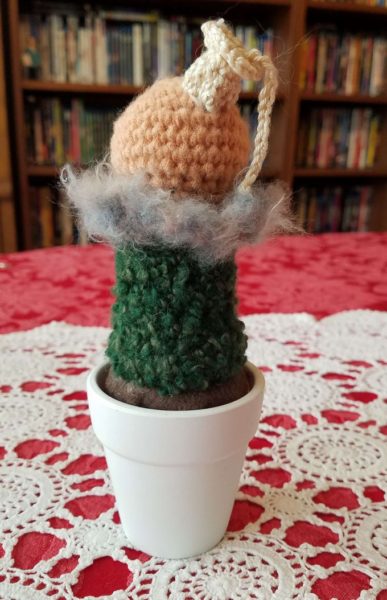
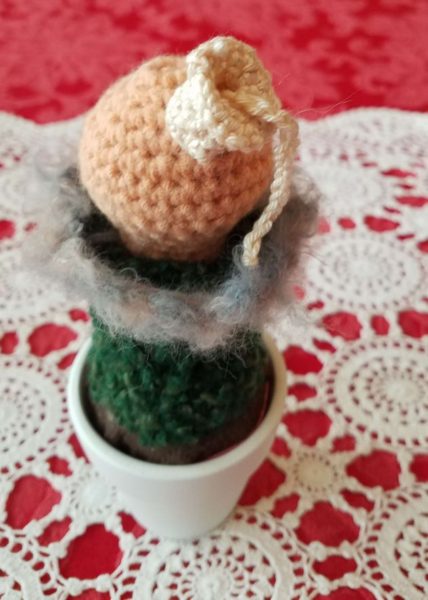
A while ago I made a kind of free-form crochet succulent sculpture. At the time I was super inspired by amigurumi and food and plants that were made out of non food and non plant materials. I still love things that look like something which they are not. Anyway, this little plush thing has been beating around various cupboards until I had a realization. I am terrible at house plants.
I try to keep some houseplants. I had a succulent display on my desk for a short while until I transitioned to work from home. Once I had that plant at home it died superfast. So, I decided to pot up my plush crochet sculpture as a replacement for an office succulent. All this really entailed was carving up a left-over Styrofoam ball from a Christmas ornaments project, cutting and gluing some felt, and cleaning up a used tiny succulent pot from a long deceased house plant. Voila! a desk plant/house plant I can’t kill!

This is another piece that I drew to someone else’s specifications (though they didn’t know it until they got it for Christmas). Long ago I thought I would hate to be an artist for hire and avoided all requests for drawing, but I find drawing something out of my norm to be very invigorating. Granted, my most recent experiences did not involve negotiated changes to the art. This is something I saw in my Father’s industry that steered me away from an art career of any kind.
Anyway, the picture is of Tyra Banks’ character Nora in Halloween Resurrection (wiki) enjoying a latte while her coworker is murdered on a screen just outside her eye-line. I had to composite a few different angles from the movie as the two images do not appear quite like I needed them to in the movie as I’ve seen it.
We cancelled regular cable services a little while ago, and while we subscribe to some streaming channels and services, we have been getting a lot of entertainment from YouTube. I want to do a round up of all the fabulous channels and creators I have been enjoying, and the Crafsman will definitely be on it. This video is too beautiful not to share right away (that is, as soon as I’ve seen it), and perhaps every single year to come. It’s still January. Lunar new year has not yet passed. Happy New Year!
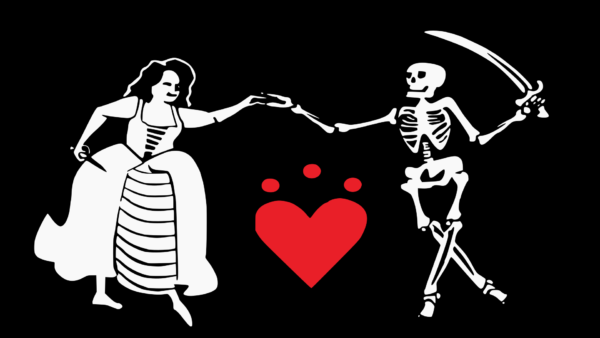
Anyone searching online for Jacquotte Delahaye may get more results for historical reenactment costuming and RPG characters than any real information. Known as ‘Back from the Dead Red,’ Jacquotte Delahaye’s existence has been called into doubt by several scholars, but her story is one that puts a strong female spin on the “Golden Age of Piracy.” So far, no primary source material has confirmed the details of her life that surfaced after her supposed death. Léon Treich, a French writer of fiction, wrote the most comprehensive account of her exploits. As someone from Tampa, a city where every January we honor a famous pirate for whom there is also no evidence of existence, I though it would be fitting to celebrate Jacquotte Delahaye for this years Gasparilla Festival.
At the start of the ‘Golden Age of Piracy’ (1650-1720), Jacquotte Delahaye was already twenty. Jacquotte’s father was French and her mother was Haitian, though some scholars hypothesize that one of them must have been Spanish. Delahaye had worked as a barmaid and a lady’s maid before beginning her pirating career in order to support her disabled younger brother after their mother died in childbirth and their father was murdered in a Spanish raid of Saint Domingue by the British Navy. Unlike many other female pirates, Delahaye’s career did not seem to depend on her relationships with male pirates.
She was ruthless and successful in battle, given to violent excess and earning the nickname ‘The Lash.’ This nickname would quickly be eclipsed by a new moniker: ‘Back from the Dead Red’ after she faked her death in battle and rose again, with a male alias and in men’s clothes. The name ‘Back from the Dead Red’ also encompasses Delahaye’s most telling characteristic: bright red hair. At 26, she captured Fort de la Roche on the island of Tortuga back from the Spanish, after which she was appointed advisor to its governor.. This exploit is considered by many to be her greatest accomplishment. Seven years later she was killed in a shoot-out with the Spanish.
Delahaye is also said to have operated with Anne Dieu-le-Veut, another female pirate who showed up in the Caribbean after Delahaye’s death. Whether or not the two women existed at the same time, scholars have indicated that Delahaye’s life corresponds closely with that of Dieu-le-Veut. Was Delahaye Treich’s fictional overlay for Dieu-le-Veut? Or should we find her reported death in 1663 unbelievable, since we know she had already faked her death once before?
You may have noticed the uptick in crafty blogging lately. I did a whole bunch of making prior to the holidays. Some of the the makes were for gifts and some were for decoration. I really enjoyed myself and I feel like I am returning to a more makery me. Crafty posts may continue.




I was gifted a glass bottle cutting kit at the end of 2020 and the two first crafts I wanted to tackle were bottle bottom candles and bottle chimes. I had bought a bottle chime for our house a while ago. It has a chain running through it from the hanging ring through the clapper and down to the wind catch. I also scoped out some tutorials online that used hot clue and rope, but in the end, used the bottle chime I had as a pattern.
I knew rope and glue wouldn’t make it through a Florida summer. Florida summers have even eaten through the small gauge chain in a lot of my store bought windchimes, contributing to a pile of chimes that I have to repair. Given that the glass would shatter if the rope/chain breaks, I thought it would be better to be hefty than dainty.
I used large wooden beads as the stopper inside that holds the bottle at the right height and the clapper. The beads are attached to the chain pieces with heavy gauge craft wire. For the hanging loop, I used some keyrings that I had on hand. I am pretty happy with the results.



Just a few snapshots from fall. The sunflowers are long gone now. I was quite happy with them, though. They are the first non-herb annual I have ever tried. Definitely the first from seed. The blanket flower is still going strong and I never knew just how much I would like the architecture of the sea grape, until now.
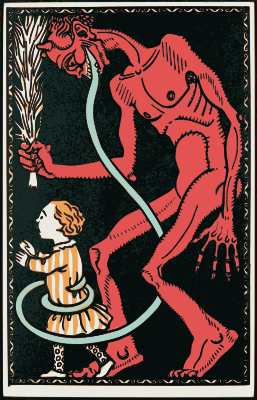
Though there is plenty of creepiness about a man who sneaks into our houses after spying on us all year to reward behavior that he deems good, Santa is far from the only holiday spirit to take on the job of keeping us all in line. Most of the witches and demons of Christmas time share this reward and punish vocation, but they haven’t all been painted as benevolent, harmless, and rosy cheeked as our dear old Claus.
Let’s begin with the Krampus. Krampus has been described as a half goat – half demon, and is one of the companions of St. Nicholas. St. Nicholas’ companions vary by region, share some similar characteristics, and seem to play the part of a shadow self or the evil side of the Saint. Where St. Nicholas rewards good girls and boys with gifts during Christmas time, the Krampus punishes naughty children by whipping them with bundled reeds, locking them in chains, and/or carrying them away in a woven basket he wears on his back. Krampus may be a vestige of pagan celebrations that pre-date Christianity; they have at times been forbidden by the Catholic Church. Lately, there has been a renewed interest in the Krampus that, because of modern humor and consumerism, some worry has been diluting the dark and violent truth of this Christmas creature.
Krampus is far from the only dark creature you might find during the winter holidays. Several cultures have tales of yuletide witches that both punish and reward as deserved. In Germany and Austria Perchta keeps an eye out for young women who do not abstain from their spinning on holidays, and those who have not yet finished their work on time. Individuals not observing the traditional fasting are also likely to be visited by Perchta’s wrath. This punishment, dear reader, is nothing to sneeze at. Far from simply whipping or chaining you, Perchta will disembowel you. After she has ripped your organs from your abdomen she will replace them with sticks, rocks, and garbage before sewing you back up again. Oddly, this punishment may have a silver lining. If you mend your ways, as much as you can with garbage inside you, then she may return with your safe and clean innards and undo her previous work. The lesson, in this case, is if you don’t take care of it you can’t have it anymore.
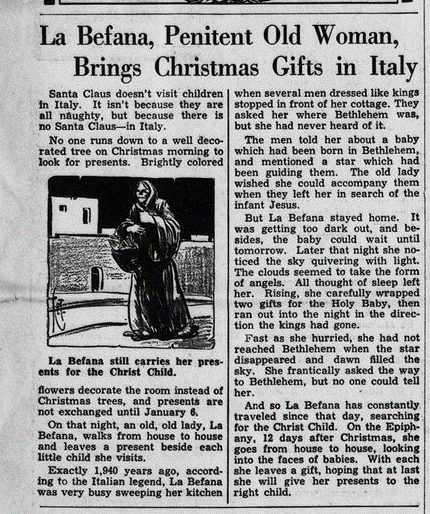
La Befana is a much more benevolent Christmastime witch. She travels around Italy during epiphany bringing gifts to good children. The story goes that the three wisemen stopped by her home looking for direction to the baby Jesus. La Befana did not know the way and neglected to join the 3 kings on their journey to Bethlehem. Not long after she regretted her decision and attempted to catch up to the 3 travelers. La Befana now travels in search of the Christ Child and leaving gifts as she goes. It has been hypothesized that La Befana is connected to the same ancient goddess as Perchta, Mother Holle, the Russian Baboushka, and Gryla.
Gryla, however, isn’t known for her kindnesses. She is an ogress, troll, or giantess, and the mother of the yule lads, seven (or thirteen) mischievous spirits who wreak havoc during Christmas time. Gryla may have multiple heads, and multiple tails, or she may simply have been an embroidered demonization of a ‘parasitic’ beggar woman. Whatever her appearance, her raison d’être is eating children who don’t obey their mother.
So, if you didn’t already think Christmas time was a time of darkness and a time to fear that which lurks in the shadows outside your door, you now have a whole host of new imagery. To me the ancient fears of demons and witches explain some of the more beautiful aspects of the holiday season, that of banding together with family and helping your neighbors. Krampus, Perchta, and Gryla may get you if you do not.
References
The Nebraska advertiser. (Nemaha City, Neb.), 22 Dec. 1905. Chronicling America: Historic American Newspapers. Lib. of Congress. <https://chroniclingamerica.loc.gov/lccn/2010270508/1905-12-22/ed-1/seq-6/>
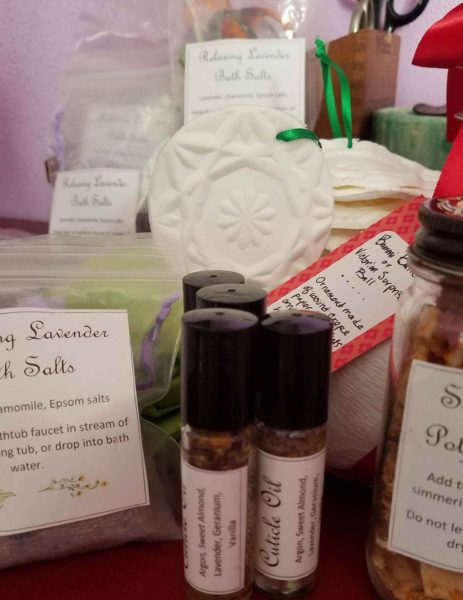
Each holiday season I get more and more into crafting presents instead of buying presents. I also get more into gifting things that can be used up and made useful. These are a few crafts that, if you have the materials, are quick and easy to make and gift.
Supplies:
I just mixed these up in the individual vials. You will only need a couple drops of each essential oil. Next, you will drop in some flowers; you don’t need many. This is really for visual interest. Then fill the vial a little over 1/3 full with the sweet almond oil. Top off the vial with argon oil and cap with the roller ball applicator. Voila!
Supplies:
If you are making many, then mixing up the salts, dried flowers and essential oil in a large bowl might be worthwhile, otherwise you can just spoon the ingredients directly into the baggies. I use one or two drops of essential oil per baggie and then tie the bags tightly closed by knotting the drawstring ribbons. These ribbons can serve as a way to hang the bag on the tub faucet so the water will run through. The only hiccough I ran into with gifting these is that not many of my friends ever take baths.

Supplies:
First, put water in your pan and put your container for melting wax over/in the water. Some people use a large measuring jug as their container, I just set a pot inside of another pot. You will want to use equipment dedicated to candle/soap/lotion making. I do not suggest using the same pots and containers that you use for cooking. Bring the water (in the outside container) to a simmer and allow your wax to melt.
While the wax is melting, pre-mix your essential oils to get the right balance. I used lavender, clove, cinnamon, and orange because that is the same combination I use for my room freshening spray in fall/winter. You can use anything that seems the nicest and most festive to you. You will also want to place some of your whole dried spices in your molds. I didn’t have anything fancy, so I wrapped old cardboard jewelry boxes in foil.
When the wax is melted pour it into your molds. You may want to place some additional spices after pouring, like the star anise and the orange wheel. I had placed all my spices in first, pouring the wax over-top, and some of them kind of got lost in the wax. Once the wax has hardened, heat up the end of a metal metal skewer to punch a hole for the ribbon (be sure you are using an oven mitt or pot holder to hold the skewer).
Supplies:
This is supper simple! Just toss the tried spices together in a bowl. If your bottle are jar is a little on the small side then you may want to break up some of the orange wheels, cinnamon sticks, and apple slices. If the jar is big, you don’t have to worry about it. Divvy up the mix among your containers. When you gift this, I suggest including instructions: “Combine potpourri mix with water in a sauce pot. Place on the stove and bring to a simmer. Enjoy the smells!”
I missed the last year or two of celebrating the Bean on its anniversary. We’re getting pretty old here, but I’ve been through so many migrations its a little hard to tell how old. I can say for sure that the Bean, as a blog, was started in December of 2007. Happy 14th birthday, Bean! 2007 is also when theLeEMSmachine.com first came about, giving a really real URL to a website I had build at the old Angelfire free pages in 2002. So, happy 19th to LeEtta’s online persona? Only, I am not sure of the month.
When I migrated to a new internet host and started using WordPress for the Bean in 2010 I lost a lot of the original Bean content. I also decided it was an opportunity to change the way I blog – less consumption, more production, and I think it has worked out rather well. Since 2010 we’ve had over 1,100 posts, mostly drawing, a lot of comics, and, especially lately, a handful of research:
#DRAWLLOWEEN #modernwitchesdaily #witchyartchallenge 24 hour comics day art books challenges characters Christmas comics consumption copyright crafting doodling drawing fabulous ideas gardening halloween history holiday Holidays in Movies inktober language LeEMSmachine Levi Levi librarians movies music NaNoWriMo Octoberfest Penelope Sea projects ranting recipes research shopping site updates stories television the house traveling webcomic witches Wolf and 7 Kids writing
I can’t say I was super productive drawing wise this year, but I have dug up a handful of year in review doodles:









For those of you who sometimes drop in on my comics, like Levi Levi and No Evil, I am still working on those and more. I also have a handful of zine projects ongoing that I will be dedicating more time to. This is starting to sound like a new years resolution post, too. Well, there you have it. Thank you all for stopping by and for hanging in with me! I hope you like what you see most days.
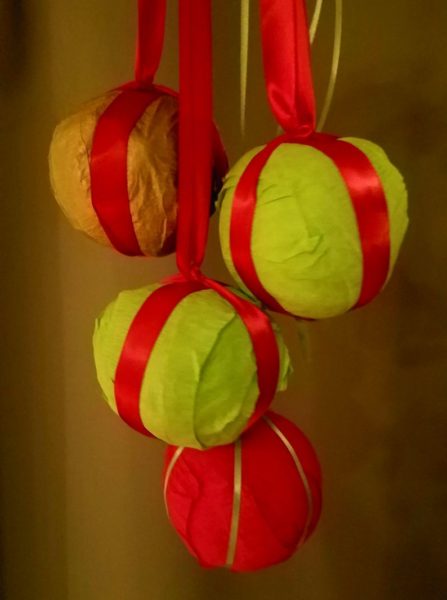
aka Surprise Balls
I am not sure where I first learned the name Bami Ballen. When I searched for them by that name after having obtained my first store bought Bami Ballen, I could find precious little online. There are a few more people calling it by that name now, but mostly they are sold as surprise balls.
Surprise balls are comprised of a wound up ball of crepe paper ribbon surrounding trinkets and treats inside.
YOU WILL NEED
One crepe paper streamer of the type you can pick up in a craft store was all I needed for each of these. The resulting bami ballen are a little smaller than some store-bought versions, but not much. They are a pretty normal ornament size, and can be hung on a tree as decoration until it is time to unwind them.
To make them, you just wind the crepe paper round, adding a bunch of layers in between each trinket. I use the trinkets to help me build out the shape. Eventually, you will be able to compress it into a ball shape with your hands, if your ballen is a bit wonky shaped. I suggest keeping slender items like fortunes, jokes, and fortune fish to the outsides where they can easily wrap around the ball shape.
When you have wrapped up all your crepe paper, then secure the whole thing with a ribbon that can also serve as a hanger loop. I tend to gift mine with a little explanatory tag, just in case the recipient has never heard of them before.